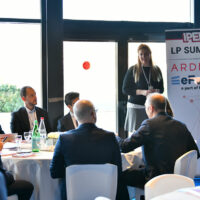IPEM Cannes 2024 – The Daily Spin – January, 25th
The shifting role of LPs was the overarching theme for the morning session of Day 2, at the 10th edition of IPEM in Cannes. After a full day of yoga,…

The next twelve months is likely to present a combination of challenging headwinds and supportive tailwinds for global private markets, requiring GPs to further sharpen, and refine, the way they seek out new investments. The spectacular failure of FTX has left some prominent investors like Sequoia Capital promising to do better next time. Venture Capital has always been a higher risk strategy as it relies on backing un-proven companies it hopes will become future successes.
Does VC need to learn anything new in how it approaches ODD from its bigger PE brother? Or will both ramp up their due diligence processes even further in 2023, as the risk environment prevails? There will surely need to be continued dialogue between GPs and LPs on deal sourcing – especially if they are co-investors – as dry powder is put to work.
The role of AI and data analytics could well become more prominent as private equity funds improve the way they analyse pre-investment risk and ongoing portfolio management risks. Doing so will bring an extra layer of protection to PE funds, arming deal partners with a greater array of data-driven insights on how companies are performing, and where they need to improve.
Investors understand the importance of adding private market funds to their wider investment programmes. Against today’s inflationary backdrop, Asia Pacific family offices have adopted mitigation strategies including increasing their exposure to real estate. Indeed, 54% of APAC family offices are looking for new investment opportunities that would add diversification, with 42% indicating a preference for alternative assets.
A changing climate for investors
PE groups are gearing up to capitalise on investment opportunities in specific sectors in a bear market environment. Tikehau Capital, for example, notes that the trend for aerospace, with its links to the defence industry, is strong. Emmanuel Laillier, head of private equity at Tikehau Capital, recently told PE Hub Europe that some investors have shunned the aerospace industry for ESG reasons but that since Russia’s invasion of Ukraine “investors’ attitudes have changed”.
Climate change is another key focus for fund managers like Tikehau Capital, whose ambition is to manage at least EUR5 billion of AUM in the fight against climate change and sustainability, by 2025.
Decarbonisation will become a key investment trend over the coming years. The UN-convened Net Zero Asset Owner Alliance (NZAOA), which consists of over 80 institutional investors with over $11 trillion in AUM, has issued a clarion call to private market participants to help push forward decarbonisation, regardless of asset class.
According to one European investor: “Anything to do with private equity growth capital in areas of the market such as energy transition and EV transport transition will attract capital from LPs. Even those investors who aren’t too worried about their carbon footprint are going to see energy transition as a growth sector that has attractive financial dynamics.”
Fundraising dynamics could well show signs of slowing down in 2023.
Those who are able to demonstrate a commitment to decarbonisation as a core principal of their investment strategy stand a better chance of catching the eye of increasingly discerning investors.
According to a recent study conducted by Bain & Company and the Institutional Limited Partners Association (ILPA), around a third (52% in Europe) of LPs have set net-zero commitments that affect investment decisions. Yet fewer than 25% of GPs can provide data on Scope 1 and 2 carbon emissions “all or most of the time”.
A key element of decarbonisation, which has largely been accelerated by the war in Ukraine, is how Europe thinks about energy security as it weans itself off Russian hydrocarbons. The build out of green energy infrastructure will be a huge undertaking and require significant private market support if it is to succeed. The European Commission envisions spending EUR210 billion over the next five years to reach its target of 40% renewables by 2030.
Energy security focus
Onshoring energy production, and re-establishing secure supply chains that Europe can properly secure without fears of external geopolitical risks, presents a huge opportunity for GPs.
In a recent blog, Commonfund wrote that Europe now has an opportunity for: (a) investment in the infrastructure to support further LNG development and (b) investment in continued development of U.S. natural gas reserves and production.
In Europe, there are plans for large-scale investments in the electricity grid as well as an EU-wide hydrogen backbone, according to the European Commission. Hydrogen hubs are already part of the bipartisan infrastructure of 2021 in the US. According to the Centre for Strategic & International Studies, hundreds of billions in private capital will be needed to reach the goals the European Union set itself in its 2020 hydrogen strategy. They note: “Investment activity, however, is still relatively low: out of the €130 billion of investment announced by project promoters in the European Union, only a small part has reached a final investment decision.”
Unlocking private capital to support the EU’s ambitious energy transition plans will be integral to achieving energy security and firming up the continent’s industrial base, on a go forward basis.
Tech crash will focus minds on profitability
Looking more broadly, beyond energy, low interest rates helped accelerate investment in growth technology over the previous decade.
Companies grew year-on-year, while their valuations soared ever skywards.
That playbook has now changed. Profitability, rather than growth, will dominate 2023. Speaking at CNBC’s Delivering Alpha conference, Thoma Bravo’s founder, Orlando Bravo, remarked “what’s a company worth that is growing at 30% and making no money? Is it 20x revenue or 3x revenue? There has been no bottom to that.”
Bill Ford, CEO of growth equity firm General Atlantic, thinks it could take several years for the IPO market to recover. “Buy yourself time,” he told the Delivering Alpha conference. “That’s what we are preaching to all our portfolio companies.”
The days of cheap capital are over…at least for now. Higher interest rates will temper growth expectations and require companies to operate leaner, more efficient business models and exercise effective cost controls to protect the bottom line. In the VC space, fund managers might find that chasing unicorns becomes a harder task, requiring them to extend their sourcing capabilities more broadly into emerging markets.
It will also require a change in mindset.
An interesting blog by Leah Hodgson of Pitchbook, suggests that VCs should “stop deifying founders” and stresses it is “important to base an investment decision on the whole of a company, not just its best attributes”.
Consolidation in the tech space could be good news for GPs, especially those who can demonstrate to investors a track record of running Buy-and-Build strategies. The trick will be identifying which platform companies to back, and which are best able to make strategic acquisitions to achieve scale.
GPs with strong operating partner networks and advisors, not only within Tech, but other key sectors such as Media/Entertainment, Healthcare and Green Energy, could find that 2023 presents an array of deal opportunities.
This is also likely to apply to Europe’s direct lending space. Managers such as Permira Credit believe the European market remains “a very attractive market to invest in”. According to David Hirschmann, “high-quality assets continue to come to market and there is room for further growth. Issuance across leveraged loan and high-yield bond markets declined sharply in the first half of 2022. That helps to create white space for private debt funds.”
As the world adjusts to a new normal, private market investors could well find attractive deal opportunities from an array of sources as they seek to build value in their portfolios.
The Afternoon of Jan. 24th – Day 1
Afternoon POWERTALKS

Theme: Sourcing Opportunities In A Changing Context
It’s Not Just The Economy, Stupid – It’s A Transformation
Sourcing Opportunities In A Changing Context | KEYNOTE
Gauging The Mood Of The European PE Industry For 2023
How Investors Can Build Conviction In Hard Times
Is Direct Lending Entering Its Golden Age, Or Times Of Doubt?
Decarbonization: The Largest Redeployment Of Capital In History?
Where Does Tech Investing Go Next?
Is Small Still Beautiful In Hard Times?
What Can PE Do To Strengthen A European Industrial Base?
Afternoon SUMMITS

INFRASTRUCTURE SUMMIT (Sponsored Summit)

PRIVATE DEBT SUMMIT (Sponsored Summit)

Afternoon SOCIAL EVENTS

NEW MANAGER LUNCH (Sponsored Event)

IPEM CANNES 2023 OFFICIAL DINNER Sponsored Event)

VC PARTY (Sponsored Event)

(In Partnership with)

The shifting role of LPs was the overarching theme for the morning session of Day 2, at the 10th edition of IPEM in Cannes. After a full day of yoga,…
Fill-in the information below to submit your event.
Fill in the information below to download the Survey.
Fill in the information below to download the Product Catalog.
Fill in the information below to download the Investor Package.
Fill in the information below to register as a journalist.
Fill in the information below to download the Factsheet.
Fill in the information below to download the Product Catalog.
Fill in the information below to download the list of firms.
Fill in the information below to download the LP Package.
Fill in the information below to download the Factsheet.
Fill in the information below to download the Wealth Discovery Package.
Fill in the information below to download the IPEM Playbook – Navigating the Wealth Revolution.
Fill in the information below to download the Factsheet.
Fill in the information below to download the Full Report.
Fill in the information below to download the Product Catalog.
Fill in the information below to download the IPEM LP Package 2025.
Fill in the information below to download the Program.